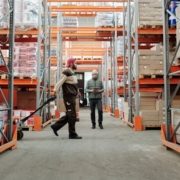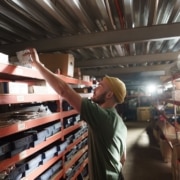How Boutique Hotels in Ireland Can Use Stocktaking to Increase Profit Margins
Running a boutique hotel in Ireland is more than offering a pretty bed and a hearty breakfast. It’s about creating a guest experience, but also about running a smart, efficient, sustainable business. Stocktaking, which may appear boring at first, is one of the most effective tools that can make your business more profitable without hurting the visitor experience.
If your first reaction is “Isn’t that just a chore for the storeroom?” we encourage you to read on, because if done right, stocktaking is one of the most effective tools for boosting boutique hotel profitability in Ireland.
What is stocktaking and why does “hotel stock management” matter?
At its simplest, stocktaking or inventory control is the process of counting what you actually have in stock, whether that’s bottled water, breakfast cereals, wines, cleaning supplies, toiletries, comparing that with what your records say you should have, and reconciling the difference.
For hotels, whether small boutique properties or larger establishments, stocktaking helps determine what’s been sold, what’s still in storage, what’s been wasted, and what might have simply disappeared.
In other words: stocktaking is the backbone of hotel stock management, a practice that gives you a clear picture of your inventory, cost of goods, wastage and wastage related losses. And for boutique hotels, where margins can be tight, this clarity can make all the difference.
Why stocktaking boosts profitability (especially for boutique hotels in Ireland)
Here’s how regular and accurate stocktaking contributes to higher profit margins and healthier financials for boutique hotels:
- Avoid over-ordering, prevent waste and expired stock
Without regular stocktakes, it’s easy to misjudge how much you actually need. You might over-order supplies just in case, only to let products sit, expire, or go unused. Stocktaking helps you see what’s gathering dust, broken down by item, by frequency, by category and avoid unnecessary purchases.
For a boutique hotel, with more limited storage and more curated offerings than large chains, this careful control helps preserve cash and reduce waste.
- Prevent stock-outs and ensure guest satisfaction
On the other hand, if you can’t see your stock well, you can run out of popular things like a unique wine, specialty toiletries, or breakfast foods. That could be unhappy guests. A well-managed inventory makes sure you have the correct things in stock at the right times.
When guests know they can count on good quality, it helps develop your reputation, get repeat reservations, and get good reviews, all of which help you make money in the long run.
- Reveal losses: wastage, over-portioning, or even theft
Stock loss isn’t always because you ordered too much. It might also be because of shrinkage, waste, bad management, or even theft. Stocktaking can show problems that go deeper by comparing the physical stock with sales and purchase data.
Once you know there’s an issue, you can implement measures (better procedures, training, security) to fix it. For boutique hotels, which often operate with smaller staffs, this kind of transparency can be critical.
- Improve cost control, which leads to better margins
Stocktaking isn’t just about what you have, it’s also about how much you paid for it. Regular inventory control can help you keep track of current purchase prices and spot when they creep up. That information gives you the power to price dishes, drinks or room service items accurately, factoring in cost increases appropriately so you protect your margins.
For boutique hotels in Ireland, often pitching themselves as premium or unique, knowing exactly what your costs are helps maintain the right balance between quality and profitability.
- Better forecasting and smarter purchasing
You can better predict demand if you have precise, up to date inventory data and trend visibility (what sells when, what remains longer, and what goes to waste). That means better ordering, neither too much nor too little and better cash flow.
This kind of planning can help a lot in Ireland’s seasonal hospitality business, especially for boutique hotels that have different amounts of guests depending on the time of year, local events, and other factors.
- Focus efforts where they really matter, high cost / high turnover items
If full hotelwide stocktakes look overwhelming, you can begin with your high risk or high value categories: e.g. premium wines, spirits, perishable food, luxury toiletries, housekeeping consumables. Frequent checks on these pain points give clarity fast, and quickly reveal where most of your losses or wastage occur.
Over time, you can gradually expand control to cover all categories but starting with the biggest risks gives early value.
The Specific Edge: Why boutique hotels in Ireland benefit even more from proper hotel stock management
- Smaller scale, but lean margins: Boutique hotels often don’t have the volume of big chains. That means waste or mismanagement has a proportionally bigger impact on profit. Stocktaking helps protect those margins.
- Seasonality and changing occupancy: Tourism in Ireland has its ups and downs, with busy times, local festivities, and down times. This means that the demand changes a lot. When demand changes, controlled stock management ensures you don’t overcommit or understock.
- Quality and guest experience are very important: Boutique hotels generally stand out because of their service, their uniqueness, and their local flavor. When things like food, drinks, and other facilities run out or go bad, that promise is breached. Taking stock helps maintain things the same.
- Cost pressures and inflation: Prices can go up or down because of problems with the supply chain in your area and throughout the world. You may keep an eye on rising costs and modify your prices or menu items as needed by doing regular stocktakes.
This keeps your margins high without lowering quality.
How to implement stocktaking in a boutique hotel
You don’t have to make stocktaking a dreaded, once a year chore. Start simple, scale gradually, and integrate the process in a way that works for your team and operations. Here’s a suggested approach:
- Make a plan for taking stock
Tell people why you’re taking stock (to save money, halt loss, or cut down on waste), what categories you’ll cover first (food, drinks, toiletries, and cleaning supplies), and how often you’ll do it (monthly, quarterly, or weekly for high risk products).
Your team will comprehend the goal better if you set clear goals. It’s not about micromanaging; it’s about making sure the hotel stays open and makes money.
- Sort and organize your inventory
Make sure that storage places are clean, products are clearly labeled, related items are grouped together (for example, food vs. toiletries vs. cleaning), and stock lists are made or updated. A logical numbering or coding scheme makes it easier to count.
This speeds up stocktaking and makes it less likely that mistakes will happen, which is great for small teams.
- Choose a method: manual, software assisted, or outsourced
- It works to do manual stocktaking with clipboards, pens, and printed sheets, but it’s slow and easy to make mistakes.
- If you connect your point of sale or ordering system to software assisted inventory management, it can automate a lot of processes, offer you real time data, and cut down on the amount of work you have to do by hand.
- Another option is to hire a professional stocktaking service. This gives you unbiased, expert eyes and frees up your core team. This is an excellent choice if you don’t have enough people or merely want solid results without interrupting operations.
- Run stocktakes regularly and track results over time
Initially, being consistent is more important than being perfect. Over time, you’ll start to see patterns: what sells, what doesn’t, where waste happens, and where over ordering happens. Make the necessary changes to orders, suppliers, and menus.
- Use insights to refine operations, pricing and purchasing
- If you see a stock that isn’t moving quickly, think about running a sale, offering a package deal, or stopping the stock.
- Keep an eye on escalating purchasing expenses and evaluate supplier contracts, renegotiate, or change prices.
- If you see waste or shrinkage, you should retrain your team, change how you store and handle things, or strengthen your controls.
- Recognize items with high margins and either market them more or make sure they are always in stock.
Common problems and how boutique hotels can get around them
You could be thinking, “This sounds great, but we’re small, we don’t have a lot of staff, and we don’t have time to do inventories every week.” That’s a reasonable worry.
Many hospitality businesses avoid regular stocktaking for that reason. But here’s how you can make it manageable:
- Start small: just a few categories (e.g. wine, breakfast food, toiletries) to get a feel for the process.
- Use technology: even basic inventory software or a spreadsheet can speed up counting and reduce errors.
- Be careful when assigning tasks: maybe one staff member does stocktaking once a month. Don’t make it a side job or blame everyone for it during a busy shift.
- Schedule smartly: pick a quiet time (e.g. off season, slow days) so guest operations are not disrupted.
- Outsource if needed: sometimes, paying for a professional stocktake service is cheaper (in time, lost revenue or waste) than doing it poorly and gives you a clean, objective baseline.
This kind of practical implementation is frequently the only option for a boutique hotel in Ireland to keep stocktaking going and make it useful, as staffing may be low and operations may have ups and downs.
The long term payoff: Profitability, clarity, and growth
Adopting solid hotel stock management practices like regular stocktaking, organised inventory, informed purchasing is not just about saving a few euros here and there. It builds a foundation of clarity.
You’ll know:
- What you have, and what you don’t
- What sells, and what sits idle
- What costs more than it should, and what gives you a better margin
- Where wastage or loss happens and how to plug the leaks
This clarity leads to better cash flow, smarter purchasing decisions, less waste, fewer panic buying moments, and ultimately higher profit margins.
For boutique hotels in Ireland, this means being able to offer quality amenities and experiences to guests without eroding your bottom line. It means being able to grow, invest in staff or guest experience, and remain competitive even when costs (ingredients, utilities, supply chain, inflation) rise.
Why choosing a stocktaking partner can make sense, and why you might pick HOSPITALITY PARTNERS
If you’re weighing whether to tackle stocktaking in-house or outsource, the advantages of a partner are often worth it: expertise, impartiality, time savings, and reliable, professional reporting.
We at HOSPITALITY PARTNERS know that boutique hotels are different from big chains. You need a personalized strategy that is adaptable, accurate, and in line with your guest first philosophy. With a team experienced in Irish hospitality and a stock management mindset, we can help you build stocktaking into your business model not as a periodic chore, but as a strategic asset.
We help you:
- get accurate inventory counts
- identify losses, wastage, or shrinkage
- improve ordering and forecasting
- optimise purchasing and pricing
- and ultimately, increase gross profit
If you’d like to talk about how stocktaking could work for your property or how to get started with a professional stocktake you know where to find us.
Final thoughts
Running a boutique hotel in Ireland isn’t just about charm, comfort and hospitality, it’s also about running a business that’s financially healthy, sustainable, and able to deliver consistent quality.
Stocktaking, when done thoughtfully, is one of the simplest, yet most powerful tools in your arsenal. It offers clarity, accountability, and insight, and it helps turn everyday supplies into profit, rather than waste.
If you haven’t thought about stocktaking for a while or ever, maybe now it’s time to start not because it’s glamorous, but because it works.
Here’s to better stock and better margins.








